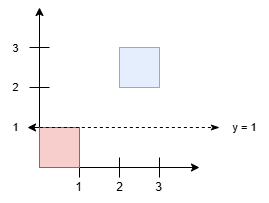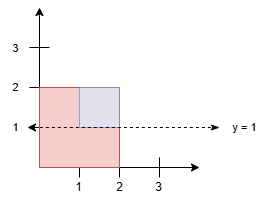LeetCode in Kotlin
3454. Separate Squares II
Hard
You are given a 2D integer array squares. Each squares[i] = [xi, yi, li] represents the coordinates of the bottom-left point and the side length of a square parallel to the x-axis.
Find the minimum y-coordinate value of a horizontal line such that the total area covered by squares above the line equals the total area covered by squares below the line.
Answers within 10-5 of the actual answer will be accepted.
Note: Squares may overlap. Overlapping areas should be counted only once in this version.
Example 1:
Input: squares = [[0,0,1],[2,2,1]]
Output: 1.00000
Explanation:

Any horizontal line between y = 1 and y = 2 results in an equal split, with 1 square unit above and 1 square unit below. The minimum y-value is 1.
Example 2:
Input: squares = [[0,0,2],[1,1,1]]
Output: 1.00000
Explanation:

Since the blue square overlaps with the red square, it will not be counted again. Thus, the line y = 1 splits the squares into two equal parts.
Constraints:
1 <= squares.length <= 5 * 104squares[i] = [xi, yi, li]squares[i].length == 30 <= xi, yi <= 1091 <= li <= 109
Solution
class Solution {
fun separateSquares(squares: Array<IntArray>): Double {
val n = squares.size
val m = 2 * n
val events = createEvents(squares, m)
val xsRaw = createXsRaw(squares, m)
events.sortWith<Event> { a, b: Event -> a.y.compareTo(b.y) }
val xs = compress(xsRaw)
val totalUnionArea = calculateTotalUnionArea(events, xs, m)
val target = totalUnionArea / 2.0
return findSplitPoint(events, xs, m, target)
}
private fun createEvents(squares: Array<IntArray>, m: Int): Array<Event> {
val events = Array(m) { Event(0.0, 0.0, 0.0, 0) }
var idx = 0
for (sq in squares) {
val x = sq[0].toDouble()
val y = sq[1].toDouble()
val l = sq[2].toDouble()
val x2 = x + l
val y2 = y + l
events[idx++] = Event(y, x, x2, 1)
events[idx++] = Event(y2, x, x2, -1)
}
return events
}
private fun createXsRaw(squares: Array<IntArray>, m: Int): DoubleArray {
val xsRaw = DoubleArray(m)
var xIdx = 0
for (sq in squares) {
val x = sq[0].toDouble()
val l = sq[2].toDouble()
xsRaw[xIdx++] = x
xsRaw[xIdx++] = x + l
}
return xsRaw
}
private fun calculateTotalUnionArea(events: Array<Event>, xs: DoubleArray, m: Int): Double {
val segTree = SegmentTree(xs)
var totalUnionArea = 0.0
var lastY = events[0].y
var i = 0
while (i < m) {
val curY = events[i].y
if (curY > lastY) {
val unionX = segTree.query()
totalUnionArea += unionX * (curY - lastY)
lastY = curY
}
while (i < m && events[i].y == curY) {
val indices = findIndices(xs, events[i])
segTree.update(1, 0, xs.size - 1, indices[0], indices[1], events[i].type)
i++
}
}
return totalUnionArea
}
private fun findSplitPoint(events: Array<Event>, xs: DoubleArray, m: Int, target: Double): Double {
val segTree = SegmentTree(xs)
var lastY = events[0].y
var cumArea = 0.0
var i = 0
while (i < m) {
val curY = events[i].y
if (curY > lastY) {
val unionX = segTree.query()
val dy = curY - lastY
if (cumArea + unionX * dy >= target - 1e-10) {
return lastY + (target - cumArea) / unionX
}
cumArea += unionX * dy
lastY = curY
}
while (i < m && events[i].y == curY) {
val indices = findIndices(xs, events[i])
segTree.update(1, 0, xs.size - 1, indices[0], indices[1], events[i].type)
i++
}
}
return lastY
}
private fun findIndices(xs: DoubleArray, event: Event): IntArray {
var lIdx = xs.binarySearch(event.x1)
if (lIdx < 0) {
lIdx = -lIdx - 1
}
var rIdx = xs.binarySearch(event.x2)
if (rIdx < 0) {
rIdx = -rIdx - 1
}
return intArrayOf(lIdx, rIdx)
}
private fun compress(arr: DoubleArray): DoubleArray {
arr.sort()
var cnt = 1
for (i in 1..<arr.size) {
if (arr[i] != arr[i - 1]) {
cnt++
}
}
val res = DoubleArray(cnt)
res[0] = arr[0]
var j = 1
for (i in 1..<arr.size) {
if (arr[i] != arr[i - 1]) {
res[j++] = arr[i]
}
}
return res
}
private class Event(var y: Double, var x1: Double, var x2: Double, var type: Int)
private class SegmentTree(var xs: DoubleArray) {
var n: Int
var tree: DoubleArray
var count: IntArray
init {
this.n = xs.size
tree = DoubleArray(4 * n)
count = IntArray(4 * n)
}
fun update(idx: Int, l: Int, r: Int, ql: Int, qr: Int, `val`: Int) {
if (qr <= l || ql >= r) {
return
}
if (ql <= l && r <= qr) {
count[idx] += `val`
} else {
val mid = (l + r) shr 1
update(idx shl 1, l, mid, ql, qr, `val`)
update(idx shl 1 or 1, mid, r, ql, qr, `val`)
}
if (count[idx] > 0) {
tree[idx] = xs[r] - xs[l]
} else if (r - l == 1) {
tree[idx] = 0.0
} else {
tree[idx] = tree[idx shl 1] + tree[idx shl 1 or 1]
}
}
fun query(): Double {
return tree[1]
}
}
}

